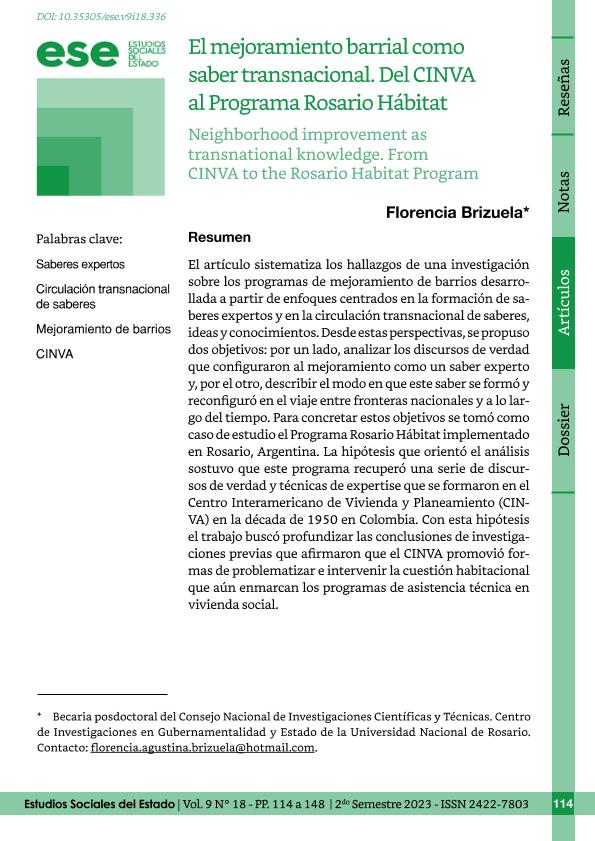Mostrar el registro sencillo del ítem
dc.contributor.author
Brizuela, Florencia Agustina

dc.date.available
2024-01-23T15:45:45Z
dc.date.issued
2023-11
dc.identifier.citation
Brizuela, Florencia Agustina; El mejoramiento barrial como saber transnacional: Del CINVA al Programa Rosario Hábitat; Consejo Nacional de Investigaciones Científicas y Tecnológicas. Centro de Investigaciones Sociales; Estudios Sociales del Estado; 9; 18; 11-2023; 114-148
dc.identifier.uri
http://hdl.handle.net/11336/224617
dc.description.abstract
El artículo sistematiza los hallazgos de una investigación sobre los programas de mejoramiento de barrios desarrollada a partir de enfoques centrados en la formación de saberes expertos y en la circulación transnacional de saberes, ideas y conocimientos. Desde estas perspectivas, se propuso dos objetivos: por un lado, analizar los discursos de verdad que configuraron al mejoramiento como un saber experto y, por el otro, describir el modo en que este saber se formó y reconfiguró en el viaje entre fronteras nacionales y a lo largo del tiempo. Para concretar estos objetivos se tomó como caso de estudio el Programa Rosario Hábitat implementado en Rosario, Argentina. La hipótesis que orientó el análisis sostuvo que este programa recuperó una serie de discursos de verdad y técnicas de expertise que se formaron en el Centro Interamericano de Vivienda y Planeamiento (CINVA) en la década de 1950 en Colombia. Con esta hipótesis el trabajo buscó profundizar las conclusiones de investigaciones previas que afirmaron que el CINVA promovió formas de problematizar e intervenir la cuestión habitacional que aún enmarcan los programas de asistencia técnica en vivienda social.
dc.description.abstract
This article systematizes the findings of an investigation on neighborhood improvement programs developed from approaches focused on expert knowledge and on the transnational circulation of knowledge and ideas. From these perspectives, the work established two objectives: to analyze the discourses of truth that shaped the improvement as an expert knowledge, and to describe the way in which this knowledge was formed and reconfigured in the journey between borders and over time. To achieve these objectives, the research studied the Programa Rosario Hábitat implemented in Rosario, Argentina, as a case study. The hypothesis that guided the analysis maintained that this program recovered a series of truth discourses and expert techniques that were formed at the Inter-American Housing and Planning Center (CINVA) in the 1950s in Colombia. With this hypothesis, the work sought to deepen the conclusions of previous investigations that affirmed that the CINVA promoted ways of problematizing and intervening the housing issue that still frame the technical assistance programs in social housing.
dc.format
application/pdf
dc.language.iso
spa
dc.publisher
Consejo Nacional de Investigaciones Científicas y Tecnológicas. Centro de Investigaciones Sociales
dc.rights
info:eu-repo/semantics/openAccess
dc.rights.uri
https://creativecommons.org/licenses/by-nc-sa/2.5/ar/
dc.subject
SABERES EXPERTOS
dc.subject
CIRCULACIÓN TRANSNACIONAL DE SABERES
dc.subject
MEJORAMIENTO DE BARRIOS
dc.subject
CINVA
dc.subject.classification
Otras Ciencias Sociales

dc.subject.classification
Otras Ciencias Sociales

dc.subject.classification
CIENCIAS SOCIALES

dc.title
El mejoramiento barrial como saber transnacional: Del CINVA al Programa Rosario Hábitat
dc.title
Neighborhood improvement as transnational knowledge: From CINVA to the Rosario Habitat Program
dc.type
info:eu-repo/semantics/article
dc.type
info:ar-repo/semantics/artículo
dc.type
info:eu-repo/semantics/publishedVersion
dc.date.updated
2024-01-22T12:40:51Z
dc.identifier.eissn
2422-7803
dc.journal.volume
9
dc.journal.number
18
dc.journal.pagination
114-148
dc.journal.pais
Argentina

dc.journal.ciudad
Ciudad Autónoma de Buenos Aires
dc.description.fil
Fil: Brizuela, Florencia Agustina. Consejo Nacional de Investigaciones Científicas y Técnicas. Centro Científico Tecnológico Conicet - Rosario; Argentina. Universidad Nacional de Rosario. Facultad de Ciencias Políticas y Relaciones Internacionales. Instituto de Investigaciones; Argentina
dc.journal.title
Estudios Sociales del Estado
dc.relation.alternativeid
info:eu-repo/semantics/altIdentifier/url/https://www.estudiossocialesdelestado.org/index.php/ese/article/view/336
dc.relation.alternativeid
info:eu-repo/semantics/altIdentifier/doi/http://dx.doi.org/10.35305/ese.v9i18.336
Archivos asociados
